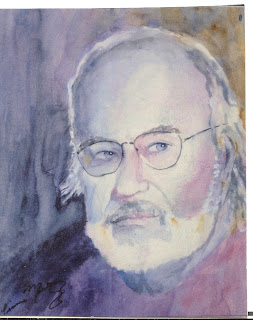THE BIBLE

LETTERS TO A FRIEND
Dear Friend,
You asked about the Bible, whether or not I believed in it. No, I don't. I embrace its message. The word "believe" is a tricky one. It can be followed either by a "that" or an "in." "That" is reserved for ideas, "in" for people. One believes in Jesus Christ. One believes that the Bible is the Word of God, but even that is tricky. It does not mean that the Bible is a collection of the words of God. It means that the Bible contains the Word of God, or the Logos, the message. Martin Luther said that the Bible is the cradle in which the Word lies. In other words, the Bible is the Word of God only as it bears witness to Jesus Christ.
The beginning point for interpreting the Bible is the person and deeds of Jesus Christ which means amongst other things that not everything in the Bible is of equal value. Many people treat the Bible as though it were a text book penned by God. Clearly, it is not, and any attempt to treat it that is a misuse of the Bible. The best way to read the Bible is to start with the Gospels, especially the passion narratives, and work backward through Saint Paul and the epistles to the prophets of the Old Testament and then the rest of the Old Testament. Of course, one should always pause amongst the Psalms because they are such beautiful poetry.
In many ways, the Bible is the history of God’s interactions with his people, as recorded by his people. The clear aim of selecting his people is that they were to be a light to the nations. It was not a call to privilege, but to service. Alan Paton, the South African author of Cry, the Beloved Country, wrote: “It is a fearful thing to fall into the hands of the living God.” The fascinating thing about the history is how honest were the historians about the ways in which they as chosen people so often got it so wrong.

In contract, an example of thinking that the Bible is a collection of the words of God is the attempt to interpret homosexuality by some obscure references in the book of Leviticus whereas the only sound way is to evaluate homosexuality in terms of the message of grace in Jesus Christ. Nowadays, many socially tyrannical people try to convert the Bible into a text book to justify their restrictive social views. The result is an unholy alliance between Fundamentalists and right-wing politicians in which inhumane policies are justified by a wrong-headed view of Scripture.
Any view that sees the Bible as the words of God is inherently idolatrous because it turns the vehicle of the message into the message itself. I suppose many people want a tangible security for an inherently intangible experience. The problem is that they miss the point and end up contorting the point at best and at worst destroying it. It’s an attempt to replace Jesus Christ with the words of the Bible.
The final effect of this distortion is a morality that is basically anti-vice rather than pro-grace. Amongst many Fundamentalists there is precious little mercy. Admittedly, some conservative Christians are actively involved in charitable projects, but, on the whole, there is more emphasis on personally purity and its attendant self-righteousness than social charity.
One of my chief criticisms of Fundamentalism other than it being idolatrously wrong-headed is that it is so often corny and fatuous. As a young man, I attended a Fundamentalist church and was always a quite uncomfortable with the trappings of Fundamentalism, especially its intellectual dishonesty, fatuous sentimentality, and bad taste. It was not until I went to college where several of my professors were devout Christians, such as the great historian of the Renaissance and Reformation, E. Harris Harbison, and Alonzo Church, whose field was mathematical logic, that I began to see that there was another way. Then in theological seminary I understood even more that one could believe in Jesus Christ with intellectual rigor, spirituality, and social awareness. Indeed, such belief enabled me to see clearly, invest myself in social justice, and live with a sense that a Presence always abided.
Sir Herbert Butterfield, the Regius professor of history at Cambridge University, once wrote, “If history can do anything, it is to remind us that all our judgments are merely relative to time and circumstance.” At the conclusion of his history of modern Europe, he wrote, “Hold to Jesus Christ, and to everything else remain uncommitted.” The Bible is the Word of God as it bears witness to the grace of God in Jesus Christ. It is he who abides.


0 Comments:
Post a Comment
Subscribe to Post Comments [Atom]
<< Home